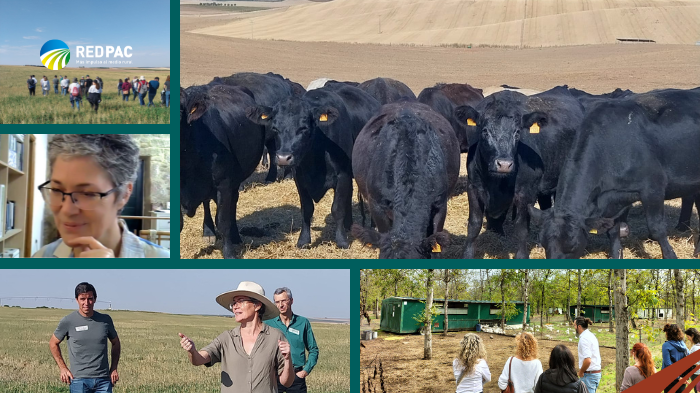
04 de November de 2025
Cambio climático y gestión de recursos naturales
Resiliencia y competitividad
Biodiversidad y paisaje
The training workshop “Introduction to Regenerative Agriculture and Livestock Farming” combined online theoretical sessions and practical visits to regenerative farms in different autonomous communities.
- The training workshop “Introduction to Regenerative Agriculture and Livestock Farming” combined online theoretical sessions and practical visits to regenerative farms in different autonomous communities.
- Participants were able to learn about different Spanish projects in the provinces of Valladolid, Tarragona and Cáceres
Regenerative agriculture and livestock farming is a production model that integrates agriculture and livestock farming with the aim of restoring soil fertility, increasing biodiversity, and optimizing the use of natural resources. Through practices that mimic natural processes , it promotes more sustainable, profitable, and resilient systems in the face of climate change.
The CAP Network organized the "Introduction to Regenerative Agriculture and Livestock Farming" workshop between October 13 and 28. This training initiative focused on soil health as a key element for the sustainability of the agricultural and livestock sector. The workshop combined three online theoretical sessions with in-person visits to model farms in Valladolid, Tarragona, and Cáceres.
The workshop had nearly 200 participants in the theoretical portion and 80 in the in-person portion, coming from various parts of Spain, reflecting the growing interest in regenerative agriculture and its potential to transform farming systems into more resilient models. The initiative aimed to promote knowledge and application of agricultural practices that regenerate ecosystems and encourage the efficient use of natural resources.
Training workshop
The workshop consisted of a 17-hour program in a mixed format, structured into three theoretical days held on October 13, 14 and 15 and a practical part developed on three different dates on October 17, 21 and 28, depending on the farm chosen by each participant.
The theoretical sessions addressed the principles, foundations, and tools of regenerative agriculture and livestock farming, a model that seeks to regenerate, stimulate, and maintain soil fertility and biodiversity. The presentations were given by specialists from the Regenerative Agriculture Association .
Ana Digón: coordinator of the Association, who presented the history and current situation of regenerative agriculture and livestock farming in the Iberian Peninsula and in Europe.
Javier García Lacal: technician in holistic management and Voisin rational grazing - dividing the land into several plots and moving the livestock from one to another following a planned order, so that each plot has time to regenerate - who explained the definitions, principles and tools that support this production model.
Alberto Pérez Roldán: technical advisor of “ Agro Holistic ” specializing in plant health, who addressed aspects related to plant nutrition and the current situation of agricultural soils.
José Luis García de Castro: veterinarian and manager of the “ Poultree ” farm (Cáceres), who shared the challenges of the transition to regenerative management and the results achieved.
Félix del Villar: farmer from Rueda (Valladolid), who presented his experience in conservation agriculture and the progress towards soil regeneration.
Ernest Mas: horticultural producer of “ Verdcamp Fruits ” (Cambrils, Tarragona), who presented his model of large-scale organic and regenerative production.
David González: technician and trainer of “ Sustraiak Habitat Design ”, who presented the “ CROPS4LIFE ” project and its Agricultural Test Space in Álava, aimed at the incorporation of new professionals into the primary sector.
Goals
The training's main objective was to introduce participants to the fundamentals of regenerative agriculture and its environmental, economic, and social benefits. Key objectives included:
To publicize the techniques used in regenerative agriculture and livestock farming.
Raising awareness about the importance of soil and its current situation in Spain.
Teaching how to manage a regenerative farm and the challenges involved in initiating change.
Show results obtained on different farms that apply this model.
To allow direct observation of good practices and success stories on reference farms.
Practical visits
As a complement to the theoretical part, the participants visited three regenerative farms, selected for their productive and geographical approaches:
Rueda (Valladolid): cereal and cattle farm, with two decades of experience in conservation agriculture and a quarter of the surface area in transition towards regenerative practices.
Cambrils (Tarragona): “Verdcamp Fruits” farm, of 300 hectares, dedicated to large-scale organic and regenerative horticultural production, without tilling or synthetic chemicals.
Villanueva de la Vera (Cáceres): “Poultree” farm, a pioneer in the management of pasture-raised chickens and cattle fed exclusively on grass through directed grazing.
During the visits, the great interest and participation of the attendees was evident, who shared doubts, reflections and proposals both in the face debates and in the open forums during the “online” sessions.
Conclusions
The various presentations and visits highlighted that soil regeneration not only improves soil fertility and biodiversity, but also strengthens the profitability and resilience of producing farms in the face of climate change.
Among the main ideas that emerged during the workshop, the following stand out:
The need to incorporate soil health as a key indicator of sustainability.
Promote continuous training to facilitate the transition to regenerative models.
Promote collaborative networks among producers to share experiences and data.
Promote public policies and specific support programs for regenerative farms.
Strengthening the links between regenerative agriculture and the CAP eco-schemes , with which it shares objectives in terms of sustainability and soil improvement.
With this workshop, the CAP Network reaffirms its commitment to promoting sustainable production models and strengthening the Spanish agricultural sector through innovation, training, and the exchange of experiences. Regenerative agriculture and livestock farming are thus presented as a solid path to ensuring a more fertile, balanced, and resilient future for the Spanish countryside.









